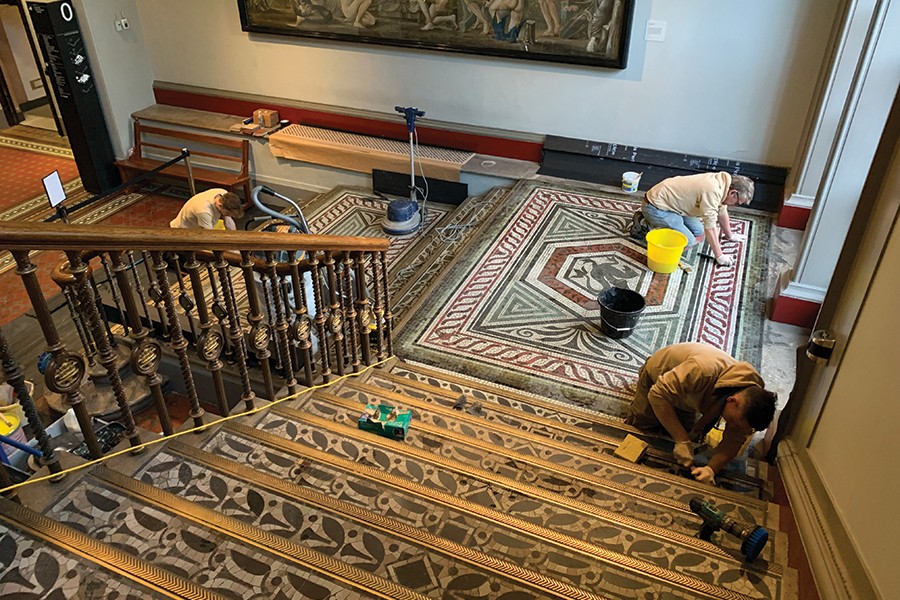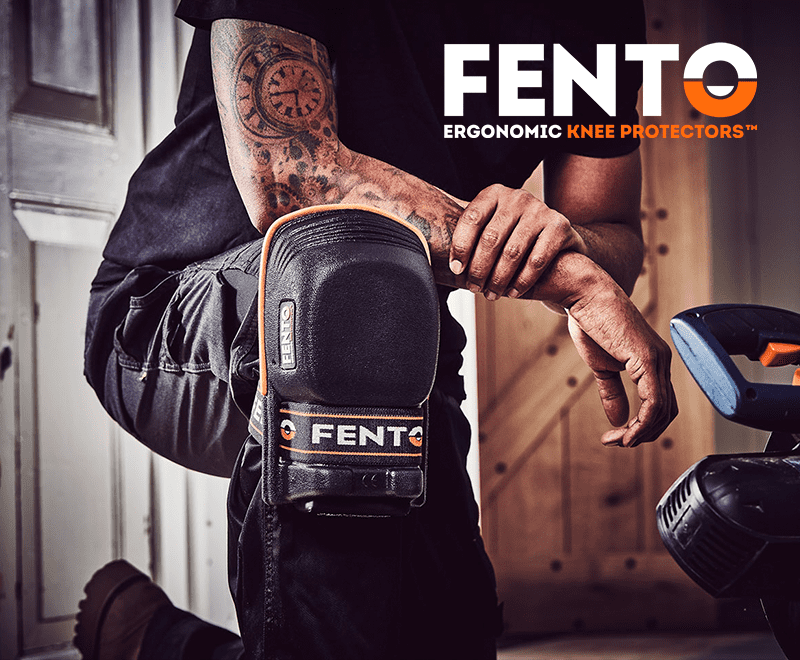Last month, we featured the first half of an interview between Adam Bernstein and Gary Bricknell of the Mosaic Restoration Company. Below is the continuation of that discussion, featuring Bricknell’s views on payment, sustainability, as well as health and safety.
Business issues
In response to a gentle prod Bricknell turns his attention to the thorny matter of payment and retentions.
He acknowledges that he’s “very much tied to the construction industry” and has “a couple of projects that are very contractual.” However, he manages this by employing a contract lead, a solicitor, to read through every contract that the company gets involved in. He mentions that “in my naïveté years ago I used to sign contracts. But I don’t anymore.” He says that reading contracts is more about the principle of getting things right.
As for bad debts, Bricknell comments that the company doesn’t have any “because we don’t sign dodgy contracts and never accept retentions.” He continues: “If they want to put a main contractors discount on, I’ll load the price. I never agree to performance bonds; all those sort things are totally out of order and retention should have been abolished years ago.”
He says that he maintains some very strong feelings about this as a subject – “I know lots of really talented people that have been badly exploited by very onerous contractual obligations that they didn’t realise when they signed.”
Further, he says that he’s “not a busy fool – I won’t work for people that just want to take advantage of me. I don’t need to do that.”
It’s interesting that Bricknell says that if he were winding the business down, because he has many years of experience he’d offer that same advice to others. “I see a lot of really talented people up down the country working really hard – in the construction industry – where they just get taken in by really naughty contracts.” He says that they don’t realise “that they’re at a turning point where the specialist – I’m talking about myself and others that get their hands dirty – are now in the minority.” He feels that those in this situation should start dictating the rules because “people sitting in offices writing these contracts are not really in a position to dictate rules that are unacceptable. If we all stand together, we won’t have the advantage taken. People have to stand their ground.”
Bricknell emphasises that in all of his years, he’s never been taken to court and preserves good relationships with main contractors. Even so, he comments that “there are some main contractors that I won’t work for. There are a lot of people like me who feel the same… they wonder why these companies fail – it’s because they treat people very badly.”
Brexit and the war in Ukraine are two topics that were addressed and in particular, if they’ve made it harder or more expensive to get hold of materials.
On Ukraine, Bricknell says that the impact has been negligible. However, Brexit is another matter entirely. He highlights the fact that the company imports raw materials mainly from Italy and some from France. “So, what happened is that before I’d order materials from Carrara in Italy, and because I’ve known these companies for years orders would arrive in about four to six weeks. Now I place an order and it has to go through an agent. It then sits in customs and I have 4 to pay the VAT up front; VAT is a pain.” So, yes, Brexit’s impact on Bricknell is very real – it’s doubled the lead time to obtain materials and requires VAT to be sooner.
Sustainability speaking
Onto a key topic for the modern world, sustainability, it’s fair to question how Bricknell manages this and whether he is seeing new products coming that are better for the environment.
Thankfully Bricknell reports that there are new and more sustainable products filtering through. He says that “there are always changes and the world is constantly evolving, but I think it’s down to us to make sure that we’re fully au fait with them.” To this he adds that “I think that’s what makes us a little bit unusual is the fact that most of our work is restoration work. We work with old salvage materials and use old techniques; we might be using lime mortar and materials like that. We’re obliged to use traditional techniques and methods. And if you’re talking about environmental impact and cost saving, then we are pretty proactive.”
On top of that Bricknell says that the workshop in Daventry is looking at placing solar panels on its roof. Also, he says that the company recycles everything it can and has engaged a company to segregate everything that can be reused: “We’re very hot on this and the guys with me are the same – because that’s part of the company ethos.”
As for clients specifying sustainability over the right job at the right price, Bricknell says that some will do: “What is interesting, for example, is a big job at Manchester Town Hall. We are there for two years and there are contractual obligations in terms of sustainability and also social engagement – we have to meet certain criteria and that’s a good thing.” While he reckons that any company, big or small, can ‘follow’ the rules, he likes to honour the requirements for a number of reasons, not least of which is that it means “we get the job.”
Health and safety management
Given that the Mosaic Restoration Company is in the construction sector health and safety is high up on Bricknell’s agenda. He says that as for any other contractor, “we’ve got to be very careful: We write risk assessments and method statements, we’re Constructionline Gold Accredited which is the highest we can get. We take health and safety very seriously.” He says that all of his operatives have passed the Construction Skills Certification Scheme, have asbestos awareness certificates, wear facemasks, and most are first aid trained. Nevertheless, he’s says that “while we’re pretty good on health and safety it is a challenge because we’re using old materials and old techniques.”
Bricknell then refers to a machine that looks like a drill-cum-lathe on end with a chisel inserted that points downwards. In explaining what it does he says that it’s a fly press from the boot and shoe industry which has been adapted to be a mechanical hammer and hardie.
In detail, he says that “it’s effectively a hammer with an inverted chisel. The operative holds a mosaic tile which is hit with the chisel.” He warns that “those searching online for a hammer and hardie will find images that make them ask ‘is that going to take the top of your fingers off if you miss’? But what we did we was to adapt a fly press so that we don’t need as much mechanical effort and so can hold the mosaic tile in a hand without swinging a hammer around; actually, it’s the safest way of carrying out that manual cutting of marble predominantly or glass.”
And to manage dust particles from cutting, Bricknell says that he has acquired and deployed four air cubes as well as masks: “We’ve got extractors but we use air cubes so that when we’re cutting would put these air cubes next to where we’re working. They’re really clever – they suck the air in and scrub it down to 0.002 microns and then chuck out clean air.”
To finish
From what Bricknell has said, it very much looks like the world is looking very rosy at the moment for the Mosaic Restoration Company. With plenty work and booking two years ahead, the only thing he really seems to need to worry about is getting the right people on board to help him complete projects.
Bricknell fully recognises that he’s lucky and appreciates that he’s in a niche market. But it’s taken him a long time to get to where he is with the required skills that he and others have picked up along the way.
In parting, Bricknell comments that “we are, compared to other trades, very fortunate. But what I will say is that I’m only as good as my last job – if something goes wrong then that’s it for me and I’m aware of that; that’s quite a risk. My reputation is very important to me.”
But since the company has received numerous awards over the years including Excellence in Contract Tiling from The Tile Association, and in 2018, the Sussex Heritage Award for mosaic works to Hastings Library as well as – for Bricknell – Master Craftsman Wall and Floor Tiler from The Worshipful Company of Tylers and Bricklayers in the same year, it’s safe to say that his company’s future is assured.
And with a nod to where Bricknell works, we’ll say amen to that.
www.mosaicrestoration.co.uk








